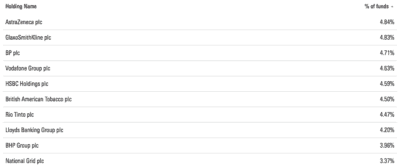If you’re looking for a new home for your savings after the collapse of the Woodford Equity Income fund, you may be considering the Vanguard FTSE UK Equity Income index.
This is a low-cost tracker fund that invests in UK dividend-paying companies and sports a bumper yield. Here, I take a closer look at this fund and highlight the risks you need to be aware of.
Investment strategy
The first thing to understand about Vanguard is its investment strategy. A passive fund (meaning there’s no fund manager), it seeks to track the performance of the FTSE UK Equity Income Index – which consists of stocks listed on the London Stock Exchange’s main market that are expected to pay dividends that generally are higher than average.
At 30 September, the fund held 128 stocks, so it’s well diversified. Note, however, the top 10 holdings (below) made up over 40% of the fund, meaning there’s a degree of stock-specific risk.

Source: Vanguard
Yield
In terms of yield, this fund’s certainly a winner. At end-September, the yield offered was a bumper 5.2%. By contrast, Vanguard’s FTSE 100 tracker offers a yield of 4.2%. It’s important to remember though that yields fluctuate depending on the dividends paid out by the underlying companies in the index. Dividends are paid out bi-annually and will either be paid in cash or reinvested, depending on whether you invest in the income or accumulation version of the fund.
Fees
Another great feature of this fund is its super low cost. Vanguard has recently slashed the fees on many of its funds and, on its website, it advertises this fund with a low ongoing charge of just 0.14%. On Hargreaves Lansdown, however, the fee is still 0.22% (this may be reduced in the near future).
Risks
Turning to risks, there are a number of risks you need to be aware of. Firstly, the fund has high exposure to high-yield stocks. Nearly all the stocks in the top 10 holdings yield 5%, or higher.
Now, while this kind of strategy will help the fund generate a high yield, it may not produce brilliant total returns (capital gains plus income) over the long run. Interestingly, the fund has underperformed the market by a wide margin over the last five years, returning around 27%, versus 41% for the FTSE All-Share index.
Secondly, the fund has a relatively high exposure to the financial sector. At 30 September, financials represented nearly a quarter of the portfolio. If this sector was to underperform on the back of a global recession, the fund’s performance (and its yield) could be impacted negatively.
Finally, with no fund manager at the helm, there’s uncertainty as to how the fund will perform in a major bear market. This fund was launched in June 2009, as markets were recovering from the Global Financial Crisis, so it’s unproven in a major stock market collapse. That’s certainly something to keep in mind.
Summary
Overall, given its high yield and low fees, I see this fund as a good choice for those who are looking to generate an income right now, such as those in retirement. If you don’t need the income right now, however, you may be better off in a fund that’s more focused on total returns, in my view.







